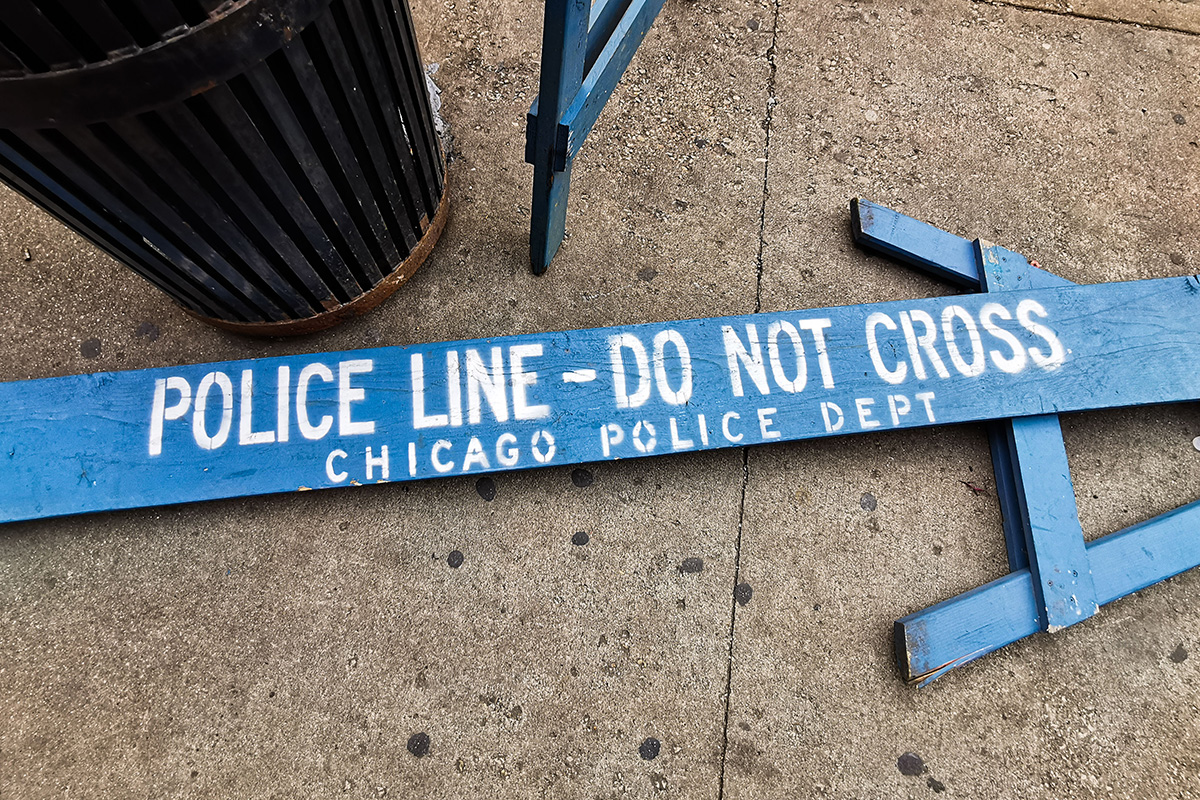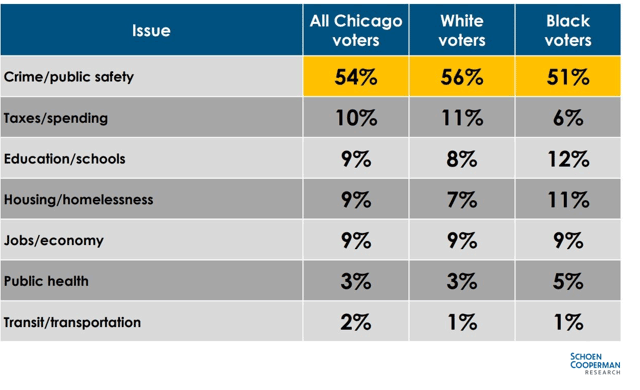Winds of Change in the Windy City: Crime and Public Safety Push Vallas Ahead in Chicago Mayoral Race, New Poll Shows

The Manhattan Institute, together with Schoen Cooperman Research, this month polled 600 likely April 2023 mayoral runoff voters in Chicago in order to assess the state of the city’s mayoral race, evaluate voter perceptions of crime and their approval of public officials on public safety, determine support for specific crime control policies, and measure ratings of public schools as well as support for education reform efforts. The results suggest a broad consensus among voters on the Windy City’s poor governance, declining public safety, high concern over crime, the need for more police and harsher punishments for criminals, as well as a positive inclination toward school choice.
Full Results Available: Topline, Crosstabs, Key Findings
State of the Mayoral Race
Survey findings indicate that Paul Vallas, a former schools superintendent backed by the police union, and who once worked for Mayor Richard M. Daley, has a 5-point lead (44% to 39%) in the race over Brandon Johnson, a member of the Cook County Board of Commissioners and former teachers’ union organizer. Vallas’s lead is largely attributable to concerns about crime and public safety in Chicago—which a 54% majority of voters, both white and black, indicate is the most important issue in determining their vote for mayor—and his positioning on these issues (Figure 1). However, undecided voters look more like supporters of Johnson than Vallas. They skew black, female, and young—indicating the race may further tighten in the final stretch.
Figure 1
Top Issue for Mayoral Vote

Crime and Public Safety in Chicago
A majority, propelled strongly by black Chicagoans, feel that the city is unsafe (57%) and that the level of crime is increasing (78%) (Figure 2). Voters overwhelmingly feel that Mayor Lori Lightfoot and Cook County State’s Attorney Kim Foxx have mishandled public safety issues and are responsible for the city’s crime wave. Nearly three-quarters of respondents, 71%, want to see more police officers on the streets; 79% believe there should be stronger punishments for repeat offenders; and 55% think punishments for the city’s criminals are too lenient, compared to only 15% who feel they are excessive.
Figure 2
Chicago: Safe or Unsafe

The vast majority of voters want more arrests and prosecution associated with shoplifting (80%) and car theft (89%). They also generally prefer a candidate who plans to increase public safety by hiring more police officers and arresting more criminals over one who plans to increase public safety by investing in social services and rerouting funds from traditional policing to violence prevention programming (Figure 3). However, on that question there is a gap in the feelings of black and white voters.
Figure 3
Preferences in a Generic Public Safety Horse Race

Illinois Bail Reform and Pretrial Release
While voters widely agree on the need for more police and harsher enforcement of the law for offenders in Chicago, they are more divided on state-level criminal justice reform. Chicago voters largely report familiarity with (70%) and narrow support for Illinois’s SAFE-T Act, which proposes a pretrial release system and ends cash bail (44% support, 39% oppose). However, once voters are presented with the law as a safety versus fairness trade-off, a plurality believe the law makes their community less safe. White voters and voters 50 and older are strongly in the camp that believes the SAFE-T Act has a negative impact on community safety, while younger voters say the law makes the justice system fairer. Black voters are largely split on the question (Figure 4).
Figure 4
Illinois’s Bail Reform Law Trade-Off

Education and Schools
Half of Chicagoans polled rate the quality of public schools in the city as “poor,” while only 38% rate it as “good.” Voters are eager to embrace education reform, evidenced by overwhelming support (70%) for allowing parents in Chicago to choose which public school they would like to send their children to—regardless of their zip code—and have the funding for that student follow them to their school of choice (Figure 5). A significant plurality (46%) also support opening more charter schools in the city (Figure 6). Support for school choice and expanding charters is strongest among black voters and parents.
Figure 5
Support for School Choice and Following Funds

Figure 6
Support for More Charter Schools in Chicago

The City’s Future
Perhaps the most startling datapoint from the Manhattan Institute/Schoen Cooperman Research survey, a 55% majority of Chicago voters say they have considered moving out of the city in the last few years. Half of these voters cite crime and public safety as the biggest factor driving their decision to potentially leave town—more than those who cite cost of living/inflation, taxes, jobs and the economy, weather, family, homelessness, and education combined (Figure 7).
Figure 7
Reasons for Potentially Leaving Chicago

Data suggest that the political winds in Chicago may soon blow in a different direction, especially on matters of law enforcement and education. If changes fail to manifest following the fast-approaching mayoral election, there is reason to believe the city’s population may dwindle as safety concerns among its residents persist.
Photo by Beata Zawrzel/NurPhoto via Getty Images
Are you interested in supporting the Manhattan Institute’s public-interest research and journalism? As a 501(c)(3) nonprofit, donations in support of MI and its scholars’ work are fully tax-deductible as provided by law (EIN #13-2912529).